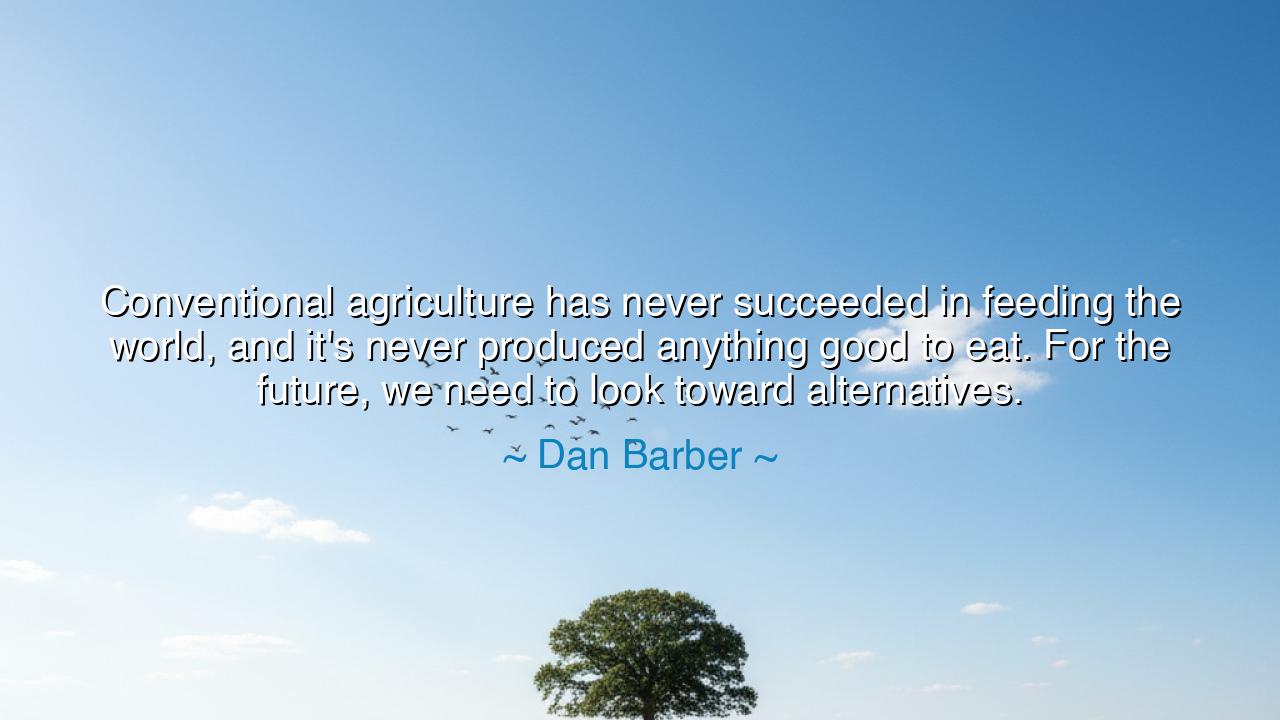
Conventional agriculture has never succeeded in feeding the
Conventional agriculture has never succeeded in feeding the world, and it's never produced anything good to eat. For the future, we need to look toward alternatives.






"Conventional agriculture has never succeeded in feeding the world, and it's never produced anything good to eat. For the future, we need to look toward alternatives." These words from Dan Barber are a clarion call to rethink the very foundation of our sustenance. They speak of a truth that has echoed throughout the ages, the failure of conventional practices to provide for humanity in a manner that honors the earth and sustains the soul. The great civilizations of the past, though they had mastered the art of agriculture, were often beset by famine and hunger, and their triumphs were built on the backs of exploitation, not balance.
The ancient world understood the fragility of life and the importance of balance. The Sumerians, the Egyptians, and the Greeks—each in their turn—cultivated the land to feed their people. Yet, even in their abundance, there were seasons of hardship, where drought or flood could erase their progress. And so, they turned to gods for intervention, for the cycle of life and death was ever intertwined with the whims of nature. The land gave generously, but it demanded reverence, for what was harvested was as much a gift as it was a responsibility.
Dan Barber’s words serve as a stark reminder that conventional agriculture, with its mechanized efficiency and reliance on monoculture, has long ignored the wisdom of balance. The soil is overworked, the seeds are uniform, and the practices have become mechanical in their pursuit of quantity over quality. This has not fed the world, nor has it nourished the body or spirit. The promise of an endless bounty has left many with empty hands—deprived of the richness that comes from truly knowing the land and its cycles.
Let us turn to history for a story that illuminates this truth. The Irish Famine of the 19th century serves as a tragic reminder of the dangers of relying on a single crop—potatoes—to sustain an entire nation. The potato blight, which ravaged the crops, left millions starving, and the agricultural practices that had been built upon a single crop were unable to adapt. In the midst of abundance, the people were left empty. This was a failure of conventional thinking—an over-reliance on one method, one crop, one practice, at the expense of diversity and sustainability. The lesson from this is clear: when we ignore alternatives, when we place all our faith in a single path, the consequences can be devastating.
The call to look toward alternatives is not just a plea for better farming practices; it is a call to return to the wisdom of the ancients. The Indigenous cultures across the world have long known the importance of working with nature, rather than trying to conquer it. Their farming practices were built on the principles of diversity, rotation, and renewal. They understood that the earth could provide for them if they treated it with respect and allowed it to regenerate. The wisdom of these practices has often been lost in the modern pursuit of efficiency, but it is not too late to return.
In the future, we must embrace the wisdom of agroecology and regenerative agriculture. We must turn to practices that work in harmony with nature, that value biodiversity over uniformity, and that seek not only to feed the body but to nourish the soul. This is not just a technical shift; it is a philosophical one. It requires a deep understanding of the interconnectedness of all things. Just as the ancient farmers once knew, the land is a living entity, and its well-being is intertwined with our own.
The lesson, then, is clear. We must shift our perspective from one of exploitation to one of partnership with the land. We must embrace alternatives that honor the earth and its gifts. And as we move forward, let us remember the wisdom of the ancients, the lessons they have left us, and the promise that a better future lies not in the mechanization of agriculture, but in its restoration. Let us commit to nourishing the soil, not just for today, but for the generations to come.






AAdministratorAdministrator
Welcome, honored guests. Please leave a comment, we will respond soon